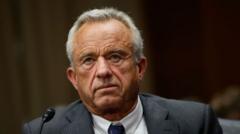Robert F. Kennedy Jr., a prominent figure and controversial choice within President Donald Trump's cabinet, has been sworn in as the US Secretary of Health and Human Services. Kennedy's confirmation comes amid significant skepticism from both political sides, questioning his previous unfounded health claims and vaccine hesitancy. The Senate confirmed him with a narrow 52-48 vote, with no Democrats supporting him and only one Republican, Mitch McConnell, opposing the nomination.
RFK Jr. Appointed as New US Health and Human Services Secretary

RFK Jr. Appointed as New US Health and Human Services Secretary
Former presidential candidate Robert F. Kennedy Jr. is officially appointed as the Secretary of Health and Human Services, stirring controversy over his views on vaccination and health policy.
Kennedy's responsibilities will encompass overseeing key health agencies, including the CDC, FDA, and NIH, along with a vast budget and workforce of around 80,000 employees. His nomination and confirmation process were marked by intense scrutiny, particularly regarding his history with vaccines. Although he has founded the anti-vaccine organization Children's Health Defense and previously cast doubt on vaccine effectiveness, he has argued that he endorses more stringent safety studies rather than a complete anti-vaccination stance.
During the confirmation hearings, Kennedy faced tough questioning concerning his controversial statements and his stance on abortion, a topic he has recently aligned more closely with Trump's views. Notably, Caroline Kennedy, his cousin, urged senators to reject him, highlighting the discrepancies between his actions and the responsibilities of the role. Despite opposition from the public and legislators, several Republican senators ultimately rallied behind him, hoping to realign the direction of the department amidst growing concerns over public health governance.
As Kennedy steps into this prominent role, observations emerge about whether he can effectively steer the nation's health policy while managing the burdens of distrust that have been instilled by health misinformation campaigns. Meanwhile, the Senate is expected to move forward with the president's other nominees, including Howard Lutnick for Commerce and Kash Patel for FBI director amid ongoing controversy.
Kennedy’s leadership in the HHS will undoubtedly have long-lasting implications, especially in the realms of vaccination policy, food safety, and overall public health strategy in the United States. With the backdrop of a divided political atmosphere, many are keenly watching how his appointment will affect the future of health policy in the nation.
During the confirmation hearings, Kennedy faced tough questioning concerning his controversial statements and his stance on abortion, a topic he has recently aligned more closely with Trump's views. Notably, Caroline Kennedy, his cousin, urged senators to reject him, highlighting the discrepancies between his actions and the responsibilities of the role. Despite opposition from the public and legislators, several Republican senators ultimately rallied behind him, hoping to realign the direction of the department amidst growing concerns over public health governance.
As Kennedy steps into this prominent role, observations emerge about whether he can effectively steer the nation's health policy while managing the burdens of distrust that have been instilled by health misinformation campaigns. Meanwhile, the Senate is expected to move forward with the president's other nominees, including Howard Lutnick for Commerce and Kash Patel for FBI director amid ongoing controversy.
Kennedy’s leadership in the HHS will undoubtedly have long-lasting implications, especially in the realms of vaccination policy, food safety, and overall public health strategy in the United States. With the backdrop of a divided political atmosphere, many are keenly watching how his appointment will affect the future of health policy in the nation.


















